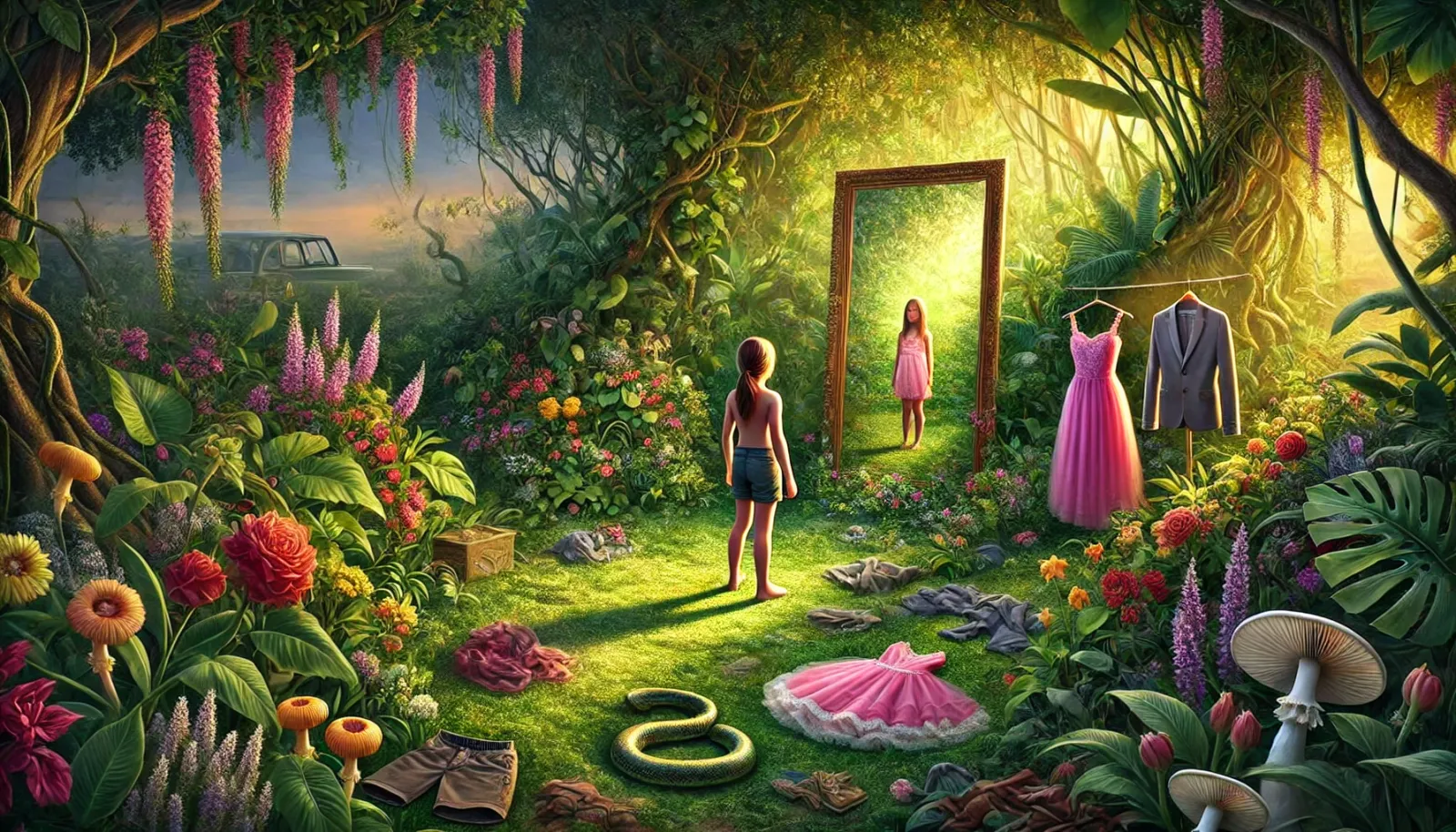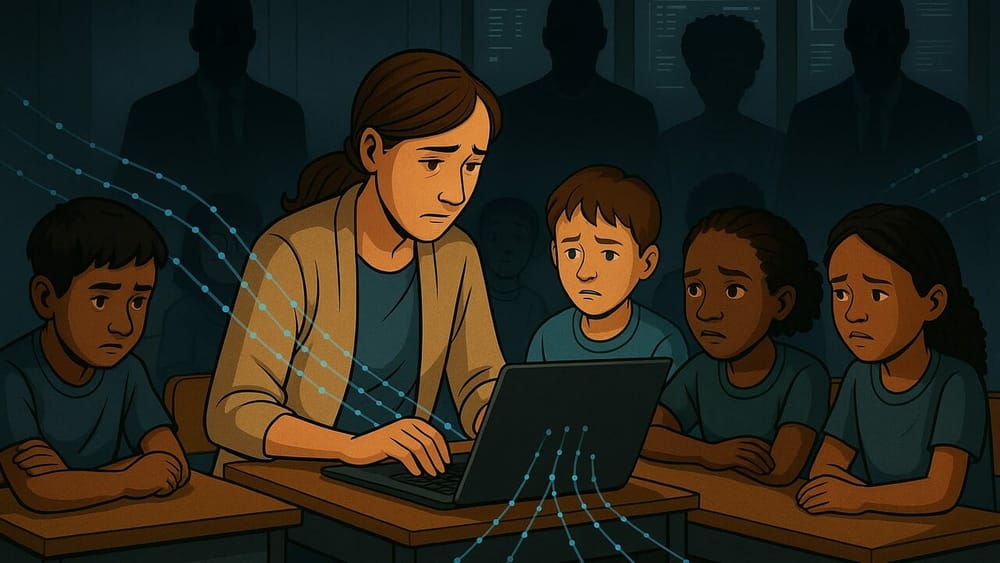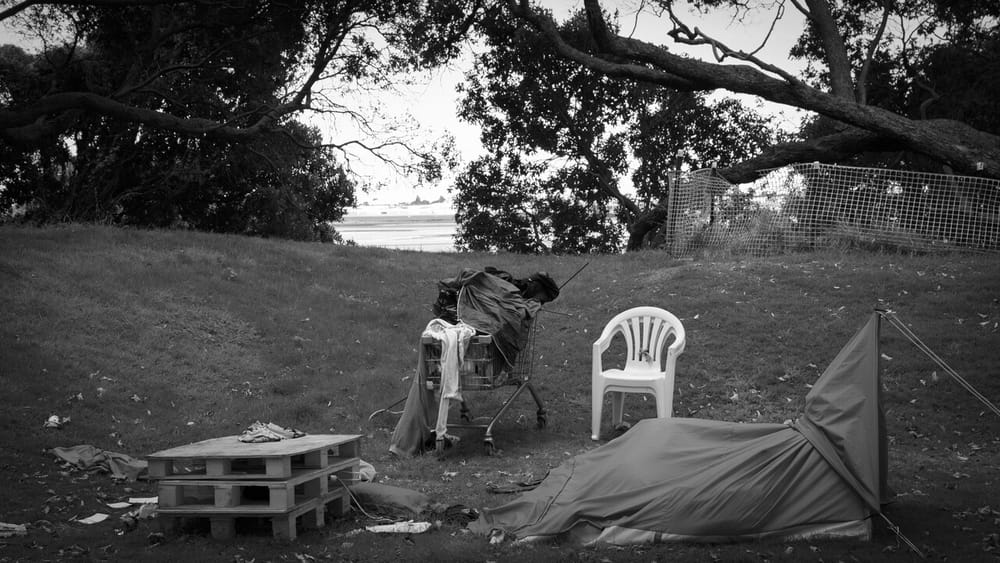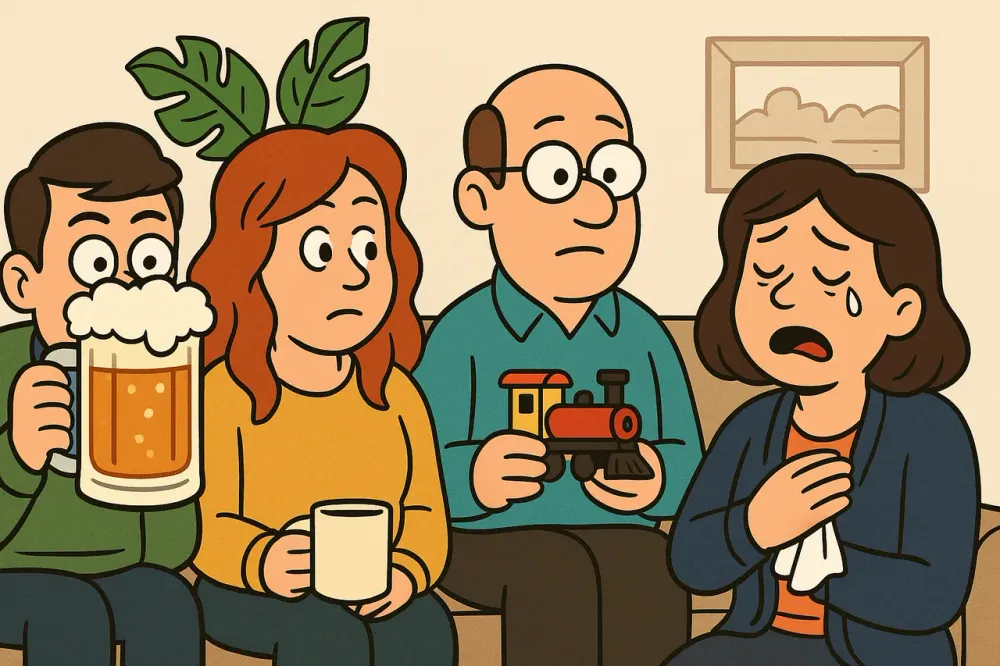It starts in Eden where everything starts, in the unconsciously-known of early childhood. It starts out as the snake hidden in the garden; the thing about yourself that you know and don’t know, can’t avoid but can’t admit, can’t ever say but can’t honestly gainsay either.
Self-knowledge is extremely hard when there is something about yourself that no one around you wants you to know, and that you yourself are trying as hard as you can not to know. You don’t want to know it, simply because it’s so wrong: so strange, so unexpected, so contrary to everything that you’ve been taught and told ever since you had ears at all. Above all, it’s so deeply embarrassing (the younger you are the more this matters).
But there, inescapably, it is. You have the body of a male; you want to have the body of a female. You want to be female; and you want everything that goes with being female.
You want to be a woman: is that it, though? Do you want to be a woman, or do you just want to dress as a woman? Is it about your sex—femaleness, the actual physical body? Or is it about your gender—femininity, the social role? Do you want to dress and present feminine as a means to the end of being female (or getting as close to it as you can)? Or do you want to be female as a means to the end of dressing and presenting as feminine (again, as far as possible)?
In everything I say here, I can only speak authoritatively for one transgender person: myself. But for me it was, and is, both changing gender as a means to changing sex, and changing sex as a means to changing gender. I wanted to be feminine in order to be female, and I wanted to be female in order to be feminine. It ran in both directions. It still does.
And is it nature or nurture? What trauma or hormone triggered it? Was it the wrong mix in the chemical brew of the womb, or was it too many Saturday mornings spent covertly reading Ballet Shoes instead of Biggles? Was it in my parents or in my DNA? I find these questions as unanswerable as “Who started it?” about the Eden narrative.
What made me transgender? What made you cisgender?
When I was small I had magical beliefs about clothing. The more emphatically feminine it was—by which I meant: the pinker, the frillier, the prettier, the girlier—the more power I believed it would have to make me female. Putting it on was, in all sorts of senses, magical. Like Frodo putting on a Ring of Power, I became my invisible self, the me that no one could ever be allowed to see. Dressing feminine defined me, I then believed, as feminine. After all, I thought, that was how it worked for my sister: didn’t my parents define her as a girl by the way they dressed her? But there wasn’t the slightest hope that my parents would ever do the same for me. (I knew this. I’d asked.) So, I thought, I’d better try to do it for myself. It wasn’t like I had any other magic wand to wave.
Secret time spent dressed feminine was time off from public being masculine. And that was always a huge relief. Dressing masculine was a weariness to the spirit: it made me feel tired, ugly, constrained, trapped, suffocated, awkward, wrong. It still does. But dressing feminine was, simply, a delight: it brought a sense of serene, calm, happy, relaxed, floating-away euphoria that nothing else gave me, a simple and straightforward innocent childlike joy; just a sense of rightness. It still does.
Except dressing feminine didn’t just do that—as any avid reader of Tolkien might have predicted. (And I was an avid reader of Tolkien. Given the uncanny fit between his myth and my own phenomenology, I have sometimes wondered what he had in his closet.) Being transgender may be euphoria, but it is also, as they say, dysphoria. Rings of Power are addictive, Tolkien taught me, and the addiction is evil and destructive. The more you give in to it, the more it turns you into—something different. But not into a beautiful girl. Into an evil spirit either squalidly pathetic or satanically terrifying or both: into Gollum, or a ring-wraith. I could get very afraid about where all this was going, what I was doing to myself, where it might be heading if I let it… and I so wanted to let it.
For most people the teenage years are probably the high season for guilt, and they certainly were for me. But I felt guilty long before I hit adolescence, because everyone and everything around me was telling me that little boys were simply not supposed to be the way I knew quite well I was: the way I kept finding I simply couldn’t help being. So I felt guilt, and I felt just plain puzzlement. Why could girls wear boring old clingy dull-coloured trousers if they liked, when boys couldn’t wear pretty floaty primary-colour skirts and dresses if they liked? Why could a girl put on my soldier outfit to play in, and get chuckles and smiles of approval and pats on the head, whereas if I put on her ballet tutu to play in, it was like I’d been caught trying to blow up Westminster Abbey?
A girl who wants to be a boy is a tomboy, I read in The Famous Five. Right, I said when I first read that, all excited (“Perhaps after all people do have words for what I’m like,” I was thinking)—so what is the word for a boy who wants to be a girl?
My peers at school answered that for me, bluntly and in chorus and repeatedly, for the next fourteen years. They didn’t know about me, of course, not officially; for a start, I didn’t have the words to tell them, even if I’d been kamikaze enough to want them to know—I didn't even learn the word “transgender” till I was 36. Yet their trans-radars were in full working order. They both knew and didn’t know, just like me. What the kids at school told me was that the word I was looking for was sissy, or queer, or mincing lisping nancy-boy, or poof, or bender, or fairy, or pansy, or big girl’s blouse, or plenty of other things. Ok, I thought, so they do have words for what I’m like. And they have hand-gestures and tones of voice and funny walks and mime-routines as well. And every single one of them is charged with hatred and contempt.
I would say school was consistently awful, except that it wasn’t; it got worse as I went up the years. It was the kind of school where everyone randomly gives unthinking abuse to everyone else, all the time (that is to say: a 1970s north of England boys’ school). And I was the kind of child who showed it when I was hurt. And the more you show them you’re hurt, the more abuse they give you. “Don’t react,” my parents told me, “don’t react.” Right; but don’t react? When everyone around you all day every day is telling you the worst and most negative things about your own body and appearance that you can think of? When your entire outer world is insisting on how male and how ugly you are, when inside—so far down inside you can barely even say it yourself—all you want to be is beautiful and feminine?
Children and parents naturally stop their physical contact, the hugs and kisses and the sitting on the knee, as the children grow. The more that reassurance was withdrawn, the more I was reassured every day by my classmates at school that I was ugly, lumpen, awkward, physically contemptible and ridiculous to look at.
I’m a Christian, and always have been, and I took it that the forces of good and evil were at war not only, self-evidently, around me, but also within. When I wasn’t praying with all my heart, last thing at night, that I would wake up the next morning and find I’d been turned into a girl, I was praying with all my heart, last thing at night, that I would wake up the next morning and find that the side of me that wanted to be a girl had just disappeared. I was a city divided against myself, and in the civil war within me, a lot of the time, I didn’t even know which side I was on, or which side of myself loathed the other more.
Mind you, I didn’t think it was bad to be transgender only for religious reasons. Everything I knew seemed to enforce that message for every other kind of reason too. I wanted a family, for instance, I wanted a wife, I wanted children; so how could I also want to be a woman myself? And alongside hopes and desires that simply went in contradictory directions to my transgender hopes and desires, and guilt whether religious or cultural, the self-loathing I’ve just talked about is always within easy reach. But I did naturally see the turmoil within me—rather grandiosely, to be sure—as one small part of a universal Manichaean cosmological conflict. This was my bit-to-do in the wider battle in the cosmic war. This was my cross to bear, or the thorn in my side. The thing of darkness that I’d do anything not to acknowledge mine was—being transgender. It was a horcrux, an evil alien implant, a Trojan virus within me that I just couldn’t seem to delete, so I had to build firewalls and quarantines around it.
As a teenager I found myself in a weekly cycle, from school to the weekend to Evensong and back to school. Even now the Anglican liturgy of Evensong has associations for me that I can barely stand. The past week of failure, derision, and confusion; the long grey miserable afternoon/ evening of dark and dismal Pennine rain; the cold mostly-empty church and the doleful slow liturgy with all its talk of sin and darkness and inner desperation; the insupportable weight of repressed, redirected, curdled or soured emotions that it seemed to carry; my own awful dull dread of school again in the morning and the start of another week just the same as the last; and the whole of my being crying out to God for rescue like a drifting ship lost and alone on a stormy dark sea in a night that is empty of landmarks.
♥♥♥
How long wilt thou forget me, O Lord? for ever? how long wilt thou hide thy face from me?
How long shall I take counsel in my soul, having sorrow in my heart daily? how long shall mine enemy be exalted over me?
♥♥♥
You can’t be transgender and not know that there is a crack in everything. Because what you experience every single day is that there’s a crack in you. There’s a gap between your body and your mind, between your sense of yourself and what you see when you look in the mirror, between what you dream of being every night and what you’ve got to be every day. And that gap, so far as I can make out, simply isn’t there for cisgendered people. They too may suffer from physical self-loathing, but by definition, it won’t be for quite this reason. They may have serious problems with their body-image: there can be a gap between the shape they are and the shape they want to be. But they experience no gap between being the gender they are and being the gender they want to be. Often they have difficulty even imagining what it might be like to feel such a gap.
In this sense it is not wrong, it seems to me, to think of being transgender as a kind of body dysmorphia. I don’t mean that that’s the only way to think about being transgender. There are as many ways of being transgender as there are transgender people, so there are lots of ways to think about it. Nor, despite the bitter old joke that goes “Q. What’s the difference between a transvestite and a transsexual? A. A divorce and about five years”, is there any such thing as the one transgender journey. Despite a surprising willingness among some trans people to prescribe to other trans people the one correct way for their individual lives to unfold, there’s no one place that everyone on the transgender spectrum is bound to end up “if they’re doing it right”.
Still, at least some of the time, at least for me, dysmorphia is exactly it. And I know other transwomen who’ve found the same. It distresses you to have the body you’ve got; you long with all your soul to have a different one—a female one. And you don’t just want to be a woman; you want to be a beautiful woman, too. And seeing how far you’re always going to be from that can leave you feeling absolutely desolate: drained and self-loathing and close to despair. The word “dysmorphia” fits. The punning suggestion of “addiction that makes you feel like shit” is spot on as well, unfortunately.
One common response to this distress is to run away from it, as far and as fast as you can. Plenty of transwomen get into body-building, or join the Territorial Army or a rugby team. (A male one.) “If I have to have a male body, I’m going to have the best one I possibly can”, they say. I understand that urge, indeed for many years I lived on it. I equally understand how following through on the urge to repress can turn transgender people suicidal, as it regularly does. (It didn’t do that to me, or not often, or not quite.) And I understand, too, the opposite urge, to use surgery as your magic wand to get you medically across to the other side of the great gender divide. But that isn’t always a happy piece of magic either. It seems it works out sometimes, and that, obviously, is great. But it also seems that some can have the surgery and still not feel like they’ve crossed over or made peace with themselves. And that can be a terrible experience.
For the first 33 years of my life, my own approach, on the whole, was to hide. Well, anyone who meets me today can see that has changed. How did it change? To report my own experience properly I have to talk about it in distinctively Christian terms; I recognise that other people might put it in other terms, or might never have felt guilty, the lucky sods, about being transgender in the first place. So my own way of putting it would be this: it was a matter of grace. Over about a month in April to May 1998 I was shown with unmistakable clarity and force that God’s love and mercy are not merely great but infinite, and that their reach very easily goes far enough to reach even me. God loves me—the message of these peak experiences was—just as I am. God made me this way, and God made no mistake. God wants me to be this way. So, Sophie/ Tim, or whatever your name is, you think you’re the worst of sinners? But this isn’t evil at all; not even a bit. Evil is running off with the pension-fund, beating people up for being different from you, treating your employees (or your boss) like dirt, cruelty to animals, casual pollution. Evil is flying a passenger jet into the Twin Towers or invading Iraq. Evil is every act of unkindness or arrogance or obstinacy or rudeness or self-absorption you’ve ever done. But being transgender? No. That’s just a way of being gendered. And there is no more an evil way of being gendered than there is an evil flavour of ice cream.
Hiding the fact that you’re transgender is hard. I know this: I hid it from absolutely everybody for 34 years, and from nearly everybody for 50 years. It’s hard in lots of ways. It gave me, for one thing, more or less permanent impostor syndrome; the whole time I was just waiting to be found out, denounced, and disgraced, and mostly I myself felt that, when that inevitably happened, it would serve me bloody well right. This mindset still comes naturally to me even now. For another thing, almost always I felt that I was being dishonest and two-faced and deceptive with everybody around me. This is both exhausting and profoundly dispiriting. And sometimes it was true; sometimes I was dishonest and two-faced and deceptive.
What’s hardest of all is that, so long as you hide it, there is one thing you can never know: which is how people would react if they knew. You’re bound to suspect that your family and friends, if they really knew all about you, couldn’t possibly go on loving you. That’s the problem of other minds, right there; and I’ve already talked about my own experience of the problem of evil, of akrasia, and of limitless Cartesian scepticism. Being transgender is endlessly philosophically educational.
But—thank goodness—my suspicions about how others would react were all, or nearly all, completely wrong. I recognise that not all transgender people are as lucky as I’ve consistently been since I came out in December 2014, and that there are all too many tragedies out there. But what I have found is that my wife and my children, and nearly all my family and friends, do still love me despite the surprising fact that I’m transgender. And some of them were very surprised indeed. To them, as to anyone who sees me from the “outside”, it’s likely to seem that things have got weird, there have been bumps in the road, since I came out. Whereas to me, that’s exactly where the weirdness stopped and where the road smoothed out. Psychologically and personally, even morally, the difficult thing for me was being transgender in secret. After that, being openly transgender is dead easy. Or at least, relatively easy.
So much for the autobiography. What does it mean for the politics? On the basis of my own experience of being transgender, what do I want to say about transgender being in society?
Well, the first thing I want to say is simply that being transgender typically involves a lot of plain distress. If you’re lucky, you can end up a happy transgender person; I have myself been very, very lucky in that way. But it doesn’t happen easily, and there are plenty of pitfalls along the road, and it never becomes completely easy. On the basis of my own experience, the first thing I feel for anyone else who’s transgender is that my heart goes out to them. To be transgender is to be wounded; being transgender hurts.
Secondly, their pain, and the alienation that often-accompanies it, can lead transgender people into unfortunate responses. One is seediness or sleaze. That was one standard way of representing transgender in the 1970s and 80s: as a kind of Rocky Horror/ Kenny Everett/ drag-queen kinkiness. Nothing wrong with kinkiness in its place. But its place is between consenting adults in the bedroom (or maybe the cinema). The kinky has no place as a representation of what it is to be transgender. A lot of the time, being transgender has very little directly to do with sexuality at all; it’s about as louche and dark and pervy as The Sound of Music. (How do I solve a problem like not being Maria?) But when the whole of society is busy telling you that you’re a filthy unnatural disgusting pervert who needs either to disappear completely, or at the very least to slink off into some murky disreputable corner, then it’s quite easy to respond, even if you don’t exactly mean to, by internalising that categorisation and behaving accordingly. I think this is changing now, thank goodness. I think it’s now become possible to express transgender as I want to express it, which is as an exuberant celebration of a perfectly innocent freedom; a gigantic yes to life, really. But my goodness, it’s taken long enough.
Another unfortunate response is anger. No one can listen to recent debates between feminism and transgender without catching a whiff of cordite. There is a huge amount of anger on both sides, and on both sides, it seems, it’s for the same sort of reasons. It’s partly lashing out in pain. And it’s partly that one historically oppressed group hopes for the support of another—and finds them not supportive at all, but treacherous. Some feminists see transgender people as treacherous because they often seem to buy, perhaps for suspected fetishistic reasons, into an ideologically constructed version of femininity which is just another part of patriarchy’s intricate system of systems of oppression. And some transgender people see feminists as treacherous because they say things like “You can’t make yourself into a fucking woman by cutting your bloody bits off”. The feminists in these debates insist that there’s more to being a woman than any socially constructed version of what it is to be a woman. And they’re right. And the transgender debaters retort that when the feminists deny the right of transwomen to call themselves women at all, they’re being essentialist. And they’re right too.
For my part, to be honest, I buy the essentialism. Or sort of. Please don’t burn me at the stake if you think this is all wrong. I’m not that well-read—to put it mildly—in feminism or gender studies or queer theory. It’s just my view, based on my own experience and not much else; if you want to persuade me of a different view, I’m happy to listen. But to put it at its crudest: I think sex is nature, gender is nurture. On the one hand there is the body you were given by biology, which usually (not always) takes a fairly definite male or female shape. That fixes your sex. And there is the feminine or the masculine that you were brought up as and/or that you choose to identify as. And that’s your gender.
This is too crude, because there are plenty of other factors in the mix too. The most obvious one is hormones, which as we’re increasingly realising, do a very great deal of work in making people “feel masculine” or “feel feminine”. But what I’m saying in my telegraphic way is this: there is a side of being male or female that is a matter of choice, and there is a side that isn’t.
So the unrestricted voluntarism of some trans activists—their idea that gender or sex is purely a matter of choice—seems unwarranted to me. Sure, whether you present as masculine or feminine, or neither, or a bit of both, is a matter of choice. But your gender or sex can’t be simply a matter of choice. If it was, wouldn’t being transgender be easy? I can tell you this for sure: if I could become completely and unequivocally a woman just by choosing to, just like that, right now, then you wouldn’t have time to blink. I’d do it like a shot, and poof—all my troubles (or at least all my gender troubles) would be over in a flash. But no transgender person’s gender troubles are ever over in a moment. Ergo, pure voluntarism has got to be wrong.
But the unrestricted essentialism of some feminists—their idea that your gender or sex can’t be a matter of choice at all: if you ask me, that’s not true either. In fact it’s false for the same reason as unrestricted voluntarism is false. My natal sex isn’t a matter of choice for me, but my gender presentation is.
So here’s the upshot of my little bit of naive gender theory. If feminists of the school of dear old sweary Germaine Greer want to insist that women are one thing and transwomen are another, then I think that they’re right about a number of transwomen. They’re probably not right about all transwomen. Some of us really do make the journey all the way, and become completely indistinguishable from natal women, at both the gender and sex levels, in every respect except history and internal anatomy. But they’re certainly right about, for example, me. I’m not a ciswoman. I might wish I was, but I don’t claim that I am. I’m a transwoman, and that’s not the same thing.
The thing is, I don’t think I should have to claim to be a ciswoman to be treated, as a transwoman, with full respect by society at large, and as an ally by feminists. I hope for the full respect of society, because I think there’s room on the gender spectrum for more than two binary positions. There’s room, too, for a choice not to place yourself anywhere on that spectrum: being non-gender-defining is another thing again. In politics, though I’d also describe myself as a socialist, I’m basically a soppy old John-Stuart-Mill liberal: I am a feminist, and I am a trans activist, because and insofar as feminism and trans activism are corollaries of Millian liberalism. So naturally I think that people should be allowed to try what Mill in On Liberty calls “experiments in living” that aren’t either traditionally male, or traditionally female, or even traditionally transgender. I suppose an experiment in living is what I’m doing in my own life. Call me naively optimistic, but it’s a free country still, just about, and I don’t expect to be out-grouped for living as I do, either by people on the “right”, or by people on the “left”.
The future of feminism, then? As you’d expect from a soppy old liberal like me, the future I hope for is one of entirely platitudinous and straightforward liberal niceness. For me it’s all about boring platitudes and truisms like these:
- live and let live.
- play nicely.
- love is all you need.
- do as you would be done by.
- maximal freedom for each consistent with maximal freedom for all.
- don’t forbid or condemn anything at all unless you really need to.
- mutual tolerance and respect wherever humanly possible.
And more specifically, as these platitudes apply to the case in hand:
- a rainbow rather than a bipolarity.
- a deeper acceptance of gender diversity, including the kinds of diversity that go way beyond the gender binary.
- a wider understanding that there are lots of different ways of being either masculine or feminine (or neither), and indeed lots of different ways of being transgender too.
- an understanding that playing and exploring and experimenting with the typology and imaginary of gender as our society has variously constructed it can be just that—play, exploration, experimentation—and doesn’t have to be the reinforcement of any oppressive stereotypes at all.
It goes without saying, mind you, that any such happily liberal future is as threatened today as is the liberal democracy that has given us all, cis or trans, these freedoms that we now live by. We need to keep up our guard, and we need to stand up for our rights. And above all, we need not to tell ourselves that all the major battles are already won. When I look around the world scene at the moment, I’m afraid I suspect that some of the biggest battles that we liberals are going to have to face are only just beginning. And this is not just to or for feminists only, or transgender people only. My cry to everyone, for everyone’s sake, is: to the barricades.







